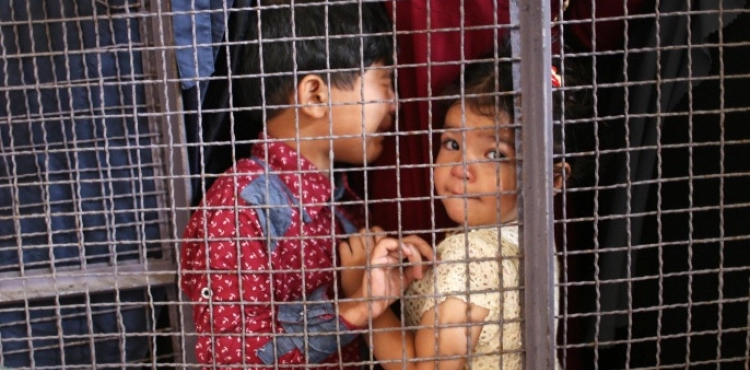Al-Mezan Center for Human Rights said today, Sunday, that the Israeli occupation forces continue to tighten their siege on the Gaza Strip, 52 days after the cessation of the latest aggression.
In a statement, the Center stressed that the occupation authorities insist on tightening the siege more severely than it was before the aggression, which leads to a further deterioration of the humanitarian situation with the continued closure of the crossings, and the frequent breakdowns of the Israeli electricity supply lines from inside the Green Line, and with Continuing to prevent entry of basic materials needed to restore the work of industrial and commercial establishments and not to initiate reconstruction.
The Center warned the international community of its continued inability to fulfill its obligations, especially its pledges to reconstruct the Gaza Strip and lift the siege imposed on it to ensure the stability of the political and security conditions and not to return to the square of violent conflict, especially since the humanitarian situation may constitute a real driver for the renewal of the conflict.
The Center pointed out that the Israeli occupation forces imposed a siege on the Gaza Strip since October 9, 2000, and then tightened the siege in 2007 after declaring the Gaza Strip a hostile entity, and prohibited the entry of basic goods and commodities as well as the export of products, and since that date the occupation authorities use its control Absolute control over the crossings and its control over the air and water as a means to achieve political goals and objectives, sometimes it prevents fishing and sometimes the area is reduced, and the same applies to the Beit Hanoun crossing, sometimes it allows the passage of patients and sometimes it deprives them of access to hospitals and allows the patient and prevents others, and the same at the Kerem Shalom crossing, preventing the entry of goods The basic materials, and sometimes allow the entry of materials and prevent others, and despite the humanitarian impact, especially the catastrophic economic and social impact on the residents of the Gaza Strip, the international community did not move to end this violation, which amounts to a war crime as a collective punishment that affects more than two million Palestinian people who are the residents of the Gaza Strip.
The Center pointed out that the residents of the Gaza Strip are facing the problem of power cuts, which is becoming more acute in light of a summer in which temperatures rise above their annual rates, which reflects itself on all aspects of life, especially basic services. 2021 indicated that the electric power deficit amounted to 55.3 percent, with all lines coming from the Israeli Electricity Company working, which is a rare occurrence, which is reflected in water, sanitation and health care services, in light of the continued Israeli restrictions on patients’ access to hospitals.
He noted that the occupation authorities continue to prevent entry of all types of raw materials and goods except for detergents, nylon rolls and paper, as they prohibit entry of all types of raw materials necessary for the operation of industrial facilities. It also prohibits entry of manufactured products such as clothes, shoes, etc., despite the approaching Eid al-Adha.
The suffering of the victims of military attacks against civilian objects and infrastructure continues, especially during the recent aggression on the Gaza Strip, as the displacement of 8,500 people whose homes were completely destroyed, in addition to about 250,000 people whose homes were partially damaged, continue to suffer from their inability to repair their homes in light of the continued ban on entry Building materials and not launching a mechanism for the reconstruction of what was destroyed by the occupation forces. In fact, obtaining a regular mattress has become difficult in light of the destruction of sponge factories and the prevention of its entry into the Gaza Strip, and this involves most of the basic household items. As stated in the statement.
The economic and social problems resulting from the siege and a series of Israeli violations are exacerbated, as the number of the unemployed exceeded half of the population, while the number of the poor reaches unprecedented proportions, and food security is lacking (68.2%) of the total population, and the percentage of families receiving aid is (70%). Of all families in the Gaza Strip. According to the statement.
The suffering of the population and local government bodies continues in light of the destruction caused by the Israeli military attacks on roads, paved streets, water and sewage feeding networks, landline telephone networks and internet lines, and the inability of municipalities and the telecommunications company to restore them in light of the chronic lack of capabilities and resources and the continued ban on entry of materials needed for repair.
Al Mezan Center for Human Rights reiterated the humanitarian repercussions of the continued closure and severe restrictions, warning that the dangerous and accelerating deterioration of the humanitarian situation would lead to the renewal of violent conflict, because the current situation in the Gaza Strip cannot be coexisted with and will necessarily lead to the outbreak of armed confrontation and conflict in its violent form. Dealing with the current reality by the international community is less humane than dealing with violent conflict and its effects that deepen the existing problems.
The Center called on the international community to take urgent and effective action to stop the escalating Israeli violations and end the blockade of the Gaza Strip, as it constitutes a collective punishment for the population and creates countless economic and social problems.












